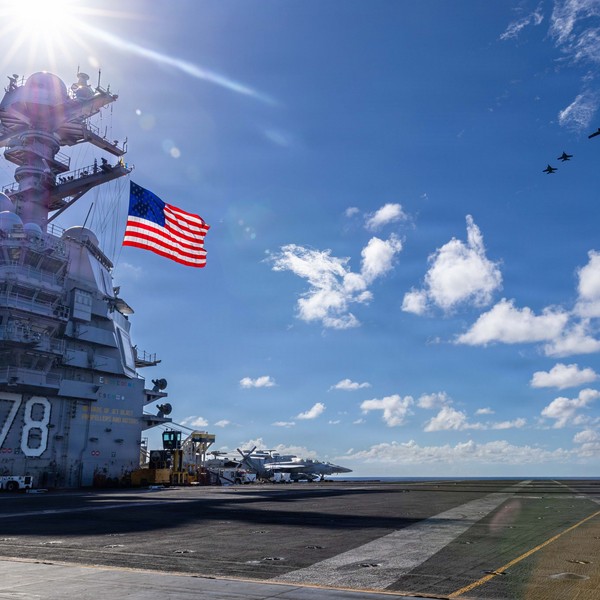This piece by Cipher Brief Expert VADM Kevin ‘Kid’ Donegan (Ret.) was first published by our friends at The Middle East Institute.
OPINION — Despite being battered, for nine months, by precision air attacks launched by forces of the United States and United Kingdom, along with absorbing retaliatory strikes by Israel, the Iran-backed Houthis have not just survived, they are thriving. This is not an arbitrary assessment; it is borne out by a host of metrics that show the Houthis are stronger and wield more influence now than they did before they began launching their attacks on Red Sea shipping lanes last October.
This is incredible given that the Houthis’ success in shutting down commercial energy and freight shipment through the Red Sea shattered a core US interest — maintaining freedom of navigation and the free flow of commerce — on which, in part, successive American presidents have based US Middle East policy.
It’s not just for the President anymore. Cipher Brief Subscriber+Members have access to their own Open Source Daily Brief, keeping you up to date on global events impacting national security. It pays to be a Subscriber+Member.
The “tale of the tape” is clear — the Houthis are winning:
- Despite a year of US and international efforts, the Red Sea remains closed to all major shipping lines.
- The Houthis have absorbed potent US and UK precision attacks on launchers, weapons storage areas, targeting systems, command-and-control nodes, and their key port of Hodeida; and throughout this time, they never paused their attacks on commercial shipping, instead having extended their range and effectiveness.
- They strengthened their supply lines to Iran that are needed for critical weapons components.
- They are the only Iranian Axis of Resistance member to directly attack Tel Aviv with ballistic missiles and drones since the outset of the Gaza war, penetrating Israeli defense systems.
- They have downed multiple US Reaper drones.
- They have not backed down despite demands by the United Nations Security Council that they stop their attacks on ships.
- They have successful pinned US forces to the Red Sea when those forces are needed to deal with developing hotspots and conflicts elsewhere.
- They have gained prominence among the Iranian Axis of Resistance and are now advising Iranian proxies in Iraq.
- Reporting suggests Russia may be providing them with more advanced weapons.
- They have increased their capability to build weapons in Yemen.
- The Houthis have strengthened their grip on power inside Yemen compared to before the Israel-Hamas conflict, when they struggled to recruit and were criticized for the failure to govern or feed the people living in the areas under their control.
Not a Subscriber+Member but need access to the national security content that the experts read? Let’s get you in.
So what is needed now from the US? The most critical necessity is leadership, with a clear mission and commitment. The Houthis are winning because the bar for them to do so is very low: they simply need to survive and absorb punishing attacks but remain resilient. They are not 10 feet tall; it is well within US capability to eliminate their ability to attack shipping.
But going forward, the US Navy cannot continue to put its sailors in harm’s way in the tight channel of the Red Sea and Bab el-Mandeb Strait with only seconds to defend themselves against incoming barrages of missiles and drones from Yemen. It is time for the US to lead the international community in what needs to be done — eliminate the Houthis’ grip on this vital international waterway.
The US successfully destroyed al-Qaeda in Yemen; and it did that with a fraction of the forces and treasure it is expending now. That success stemmed from having adopted a clearly issued intent to “destroy" al-Qaeda and the fact that this objective was carried out via a whole-of-government effort that included not just destroying the terrorist group’s military capabilities, but also disrupting their supply network, training infrastructure, financing, and most importantly eliminating their leadership. With the Houthis, US and allied forces are only attacking the arrows and doing little to destroy the broader network that provides the Yemeni group the capability to launch strikes on shipping; the most prominent omissions today are their supply chain from Iran and the Houthi leadership. The same clarity of mission and commitment is needed against the Houthis; they will not simply go away once the conflict in Gaza ends. This only becomes more important as additional disruptions to the global supply chain become likely as Israel and Iran trade punches.
Are you Subscribed to The Cipher Brief’s Digital Channel on YouTube? Watch our weekly show, The World Deciphered as Cipher Brief CEO & Publisher Suzanne Kelly sits down with CIA Director Bill Burns to talk about The Middle East, Russia, China and the thing that keeps him up at night.
Read more expert-driven national security insights, perspective and analysis in The Cipher Brief because National Security is Everyone’s Business.















